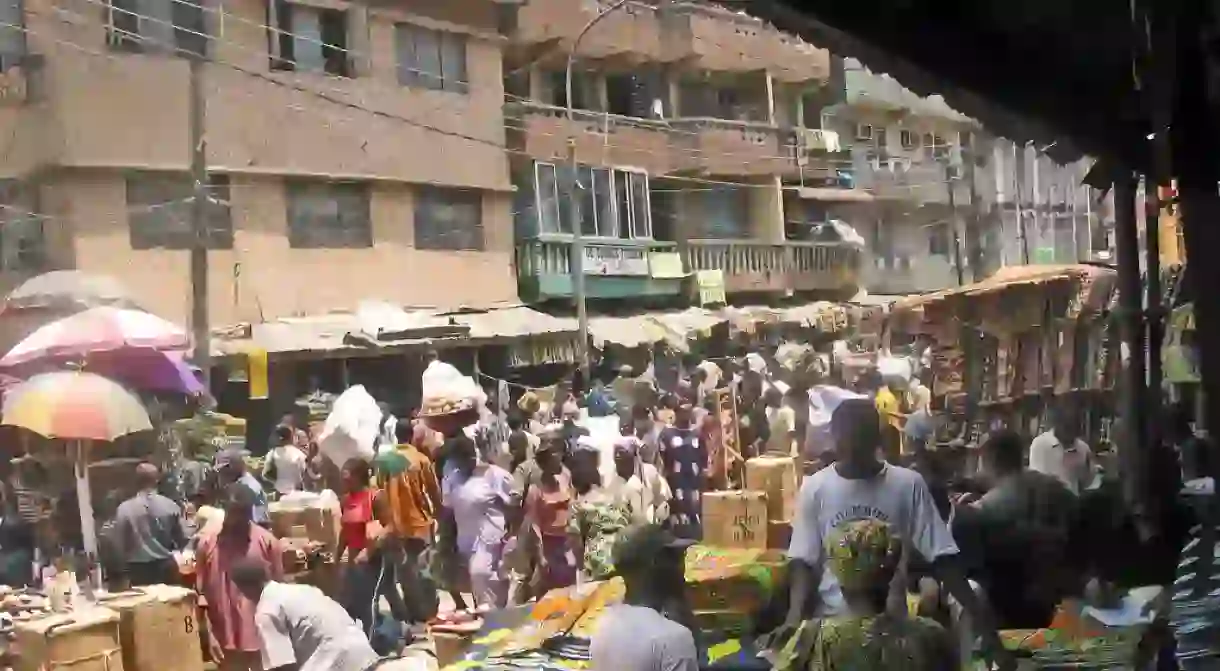The Best Markets in Nigeria

Nigerians are vivacious buyers and sellers, and the Nigerian traditional market setting is utterly fascinating. The average Nigerian market covers a vast land mass and is always busy. Usually, you can find virtually anything you want within any of these markets, ranging from groceries and electronics to arts and crafts. Here’s a look at the best markets in the country and what they have to offer.
Idumota Market, Lagos Island, Lagos
Primarily known for: Pretty much everything.
Also popularly called “Balogun market” and “Eko,” Idumota market sits in the heart of Lagos and provides you with pretty much everything you need. Here, you’ll find household items, textiles, clothing, foodstuff, electronics, jewelry, cosmetics, and more. It’s also one of the oldest and most patronized markets in Lagos.

Ariaria International Market, Aba, Abia
Primarily known for: Locally made goods.
The home of “made in Nigeria” products is one of the largest markets in Africa, and is currently eyed as one national asset that can turn the country’s economic fortunes around. Initially known only for imitating foreign products, such as electronics and designer clothing and shoe labels, the true potential that exists within Ariaria market continues to garner recognition with every new quality item they produce.
Alaba International Market, Ojo, Lagos
Primarily known for: Everything electronics; home appliances; Nollywood movies distribution.
Alaba International market is essentially the headquarters of electronic appliances in Nigeria. Around two million people from within and outside of Nigeria carry out business activities at this market each day. At Alaba market, you get some of the best appliances for great prices, as well as all of your favorite Nollywood movies. The market’s status is so prominent that its activities significantly affect Lagos State’s revenue.
Kurmi Market, Kano, Kano
Primarily known for: Craftwork, herbs.
Established in one of the oldest cities in West Africa, Kurmi Market retains its historic and cultural feel by virtue of the wares that it has on sale. Visitors to this market will find tie-dyed fabrics, cattle, herbs and spices, sculptures, and carvings.

Zaki Biam Yam Market, Ukum, Benue
Primarily known for: Yams.
At Zaki Biam, you get your yams directly from the farmers; no middle-persons. Zaki Biam market is located in what is the “food basket” of Nigeria, so you can rest assured your yams are of the highest quality. Traders from across Nigeria visit this market to buy its most renowned commodity.
Bodija Market, Ibadan, Oyo
Primarily known for: Livestock; cattle; foodstuff.
This market’s unique appeal is the wide range of high quality fresh or dried food products you can purchase on a whim. In its neatly arranged lines of stalls, you will find cattle, livestock, all manners of grains—which the country is famous for—nuts, meat and fish, ingredients and spices, and more. As with most markets in the country, it’s perfect for both wholesale and retail purchases.
Computer Village, Ikeja, Lagos
Primarily known for: Everything electronics.
The name of this market gives you a good idea of what you’re getting into. At Computer Village, there’s little chance you don’t find the phone, computer, or other type of gadget you desire. The market goes on for streets and streets, and is one of the biggest electronics markets in Nigeria. It’s also the one-stop shop for electronic repairs.

Onitsha Main Market, Onitsha, Anambra
Primarily known for: Imported second-hand clothing; jewelry; equipment.
West Africa’s “commercial powerhouse,” traders and consumers from various parts of the continent troop to Onitsha market to buy all manners of inexpensive clothing, industrial equipment, household items, and much more. In terms of size, Onitsha market is one of the biggest in Nigeria, giving it ample room to accommodate its extensive number of visitors daily.
Oil Mill Market, Port Harcourt, Rivers
Primarily known for: Local food items
Originally, the Oil Mill market was meant to open once a week on Wednesdays. And while Wednesday its still its busiest day, the market now runs daily to cater to the number of visitors it receives who are looking to buy its traditional tuber commodities or other food stuff.
Ladipo Market, Mushin, Lagos
Primarily known for: Spare parts
Any good mechanic in Lagos would advise you to go to Ladipo to buy whatever parts your car happens to need at the time. The great thing about Ladipo market is the caliber of mechanical and electrical goods it has to offer. You can choose to buy used spare parts to cut costs, and your car would be none the wiser.
Gbagi Market, Ibadan, Oyo
Primarily known for: Textiles
The quality textiles and fabrics at Gbagi market come directly from the factories, and they can be customized to suit your personal tastes, if you so demand. The market is a favorite amongst textile dealers and fashion designers in the country.













